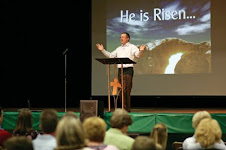"Here is a question put to every believer by this text: does discipleship mean deploying God's missiles against the enemy in righteous indignation? Or does discipleship man following him on the Calvary road which leads to suffering and death? The answer of the whole New Testament is this: the surprise about Jesus the Messiah in that he caome to live a life of sacrificial, dying service before he come a second time to reign in glory. And the surprise about discipleship is that it demands a life of sacrificial, dying service before we can reign with Christ in glory.
One might be tempted to reason in just the opposite way: that since Jesus suffered so much and died in our place, therefore, we are free to go straight to the head of the class, as it were, and skip all the exams. He suffered so we could have comfort. He died so we could live. He bore abuse so we could be esteemed. He gave up the treasures of heaven so we could lay up treasures on earth. He brought the kingdom and paid for our entrance, and now we live in it with all its earthly privileges. But all this is not biblical reasoning. It goes against the plain teaching in this very context. Luke 9:23-24 reads: 'If anyone would come after me, let him deny himself and take up his cross daily and follow me. For whoever woule save his life will lose it, but whoever loses his lfe for my sake will save it.'"
When Jesus set his face to walk this Calvary road, he was not merely taking our place; he was setting our pattern. He is substitute and pacesetter. If we seek to secure our life through returning evil for evil or surrounding ourselves with luxury in the face of human need, we will lose our life. We can save our life only if we follow Christ on the Calvary road.
Sunday, March 14, 2010
Eternal Palm Sunday
Today's thoughts concerning Easter are prompted by John Piper's Sermon, He Set His Face to Go to Jerusalem (Luke 9:51).
An Eternal Perspective: As Jesus neared Jerusalem and sat upon a donkey, his disciples, perhaps remembering Zechariah's prophesy (Zec 9:9-10) hoped that their Messiah had come to set up His earthly kingdom. In fact, they were arguing about who would get to sit beside Him. What they didn't understand was that there would be a delay. Even though Jesus was going to win the decisive victory over sin and death, the time had not yet come for full, earthly fulfillment. Piper writes,
"To be sure the disciples' understanding of Jesus' kingship at this point is flawed. But hastening events will correct that soon enough. In essence they are correct. Jesus is the king of Israel, and the kingdom he is inaugurating will bring peace to all nations and spread from sea to sea. The book of Revelation pictures the final fulfillment of Palm Sunday in the age to come like this: 'I looked, and behold, a great multitude that no man could number, from
every nation, from all tribes and peoples and languages, stading before the
throne and before the Lamb, clothed in white robes, with palm branches in their hands, and crying out with a loud voice, "Salvation belongs to our God who sits on the throne, and to the Lamb!'" (Rev. 7:9-10)
The entry into Jerusalem with waving palms (John 12:13) was a short-lived preview of the eternal Palm Sunday to come. But if Jesu had taken his throne on the first day of palms, none of us would ever be robed in white or waving palms of praise in the age to come. There had to be the cross, and that is what the disciples had not yet understood."
The Expected Pain: Jesus' death in Jerusalem was not an accident. God's eternal purpose planned it. Furthermore, Jesus understood that His death would be difficult and painful. Luke tells us that he 'set his face to go to Jerusalem' (Lk. 9:51). Our Savior understood that His trip to Jerusalem involved His being 'delivered into the hands of men (Lk. 9:44). These men would kill Him in the most painful and shameful way - crucifixion. We understand this today but did Jesus know what He was getting Himself into? Yes! Luke writes, "The Son of Man must suffer many things and be rejected by the elders and chief priests, and be killed..." (Lk. 9:22). He also knew that "...on the third day [He would] be raised."
Later, in Luke 18:31-33, we read Jesus saying, "See, we are going up to Jerusalem, and everything that is written of the Son of Man by the prophets will be accomplished. For he will be delivered over to the Gentiles and will be mocked and shamefully treated and spit upon. And after flogging him, they will kill him..."
As Easter nears, remember that Jesus' most difficult death was what our sins deserved. He died like this for us!
An Example to Pursue: The disciples' misunderstanding of Jesus' journey to Jerusalem is the same misunderstanding we must be careful to avoid. Jesus' journey is our journey. There is no quick victory that bypasses Calvary. Jesus' path is the path of discipleship. And to misunderstand His path is to misunderstand our discipleship. Let me quote Piper at length here:
Subscribe to:
Post Comments (Atom)

No comments:
Post a Comment